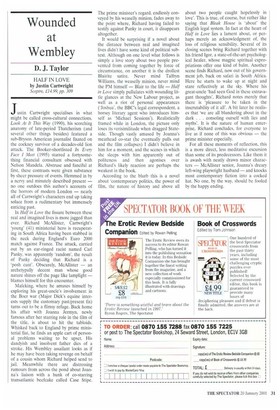Wounded at Wembley
D. J. Taylor
HALF IN LOVE by Justin Cartwright Sceptre, £14.99, pp. 309 Justin Cartwright specialises in what might be called cross-cultural connections. Look At It This Way (1990), his scorching anatomy of late-period Thatcherism (and several other things besides) featured a sub-Bryson American journalist fixated on the cockney survivor of a decades-old lion attack. The Booker-shortlisted In Evety Face I Meet (1995) starred a fortysomething financial consultant obsessed with Nelson Mandela. Abstruse and fanciful at first, these contrasts were given substance by sheer pressure of events. Hemmed in by a nervy and minutely described present — no one outdoes this author's accounts of the horrors of modern London — nearly all of Cartwright's characters end up taking solace from a rudimentary but immensely enticing past.
In Half in Love the fissure between these real and imagined lives is more jagged than ever. Richard McAllister, Cartwright's `young' (41) ministerial hero is recuperating in South Africa having been stabbed in the neck during England's Euro 2000 match against France. The attack, carried out by an ear-ringed racist named Carl Panky, was apparently `random', the result of Panky deciding that Richard is a 'posh cunt'. Obscurely, McAllister — an archetypally decent man whose good nature shines off the page like lamplight — blames himself for this encounter.
Mafeking, where he amuses himself by exploring his great-uncle's involvement in the Boer war (Major Dick's equine interests supply the customary past/present fix) turns out to be a flimsy refuge. Back home his affair with Joanna Jermyn, newly famous after her starring role in the film of the title, is about to hit the tabloids. Whisked back to England by prime ministerial fiat, he finds an apple cart of personal problems waiting to be upset. His dandyish and insolvent father dies of a stroke. His Wembley assailant looks as if he may have been taking revenge on behalf of a cousin whom Richard helped send to jail. Meanwhile there are distressing rumours from across the pond about Joanna's liaison with a hunk of co-starring transatlantic beefcake called Case Stipe. The prime minister's regard, endlessly conveyed by his weaselly minion, fades away to the point where, Richard having failed to testify against Panky in court, it disappears altogether.
It would be surprising if a novel about the distance between real and imagined lives didn't have some kind of political subtext. Although on one level what follows is simply a love story about two people prevented from coming together by force of circumstance, on another it is the drollest Blairite satire. Never mind Talfryn Williams, the weaselly minion, never mind the PM himself — Blair to the life — Half in Love simply pullulates with wounding little glances at the New Labour project, as well as a riot of personal appearances ('Joshua'. the BBC's legal correspondent, a horsey literary agent who introduces himself as 'Michael Sessions'). Realistically framed while in London, the picture only loses its verisimilitude when dragged Stateside. Though vastly amused by Joanna's meathead co-star (he eventually pulls out and the film collapses) I didn't believe in him for a moment, and the scenes in which she sleeps with him apparently out of politeness and then agonises over Richard's likely reaction are perhaps the weakest in the book.
According to the blurb this is a novel about 'contemporary politics, the power of film, the nature of history and above all about two people caught hopelessly in love'. This is true, of course, but rather like saying that Bleak House is 'about' the English legal system. In fact at the heart of Half in Love lies a lament about, or perhaps merely an acknowledgment of, the loss of religious sensibility. Several of its closing scenes bring Richard together with his friend Igor, a state-of-the-art psychological healer, whose magpie spiritual expropriations offer one kind of balm. Another scene finds Richard, now out of his government job, back on safari in South Africa. Here he starts to wake up at night and stare reflectively at the sky. Where his great-uncle 'had seen God in these extravagant thoughts'. Richard notes merely that there is 'pleasure to be taken in the inscrutability of it all'. A bit later he realises that we are all blundering about in the dark . . . consoling ourself with lies and myths'. It is the nature of human enterprise, Richard concludes, for everyone to live as if none of this was obvious — the prime minister especially.
For all these moments of reflection, this is a more direct, less meditative excursion than some of its predecessors. Like them it is awash with neatly drawn minor characters — McAllister senior, Joanna's dreary left-wing playwright husband — and knocks most contemporary fiction into a cocked hat. No one, by the way, should be fooled by the happy ending.






























































 Previous page
Previous page